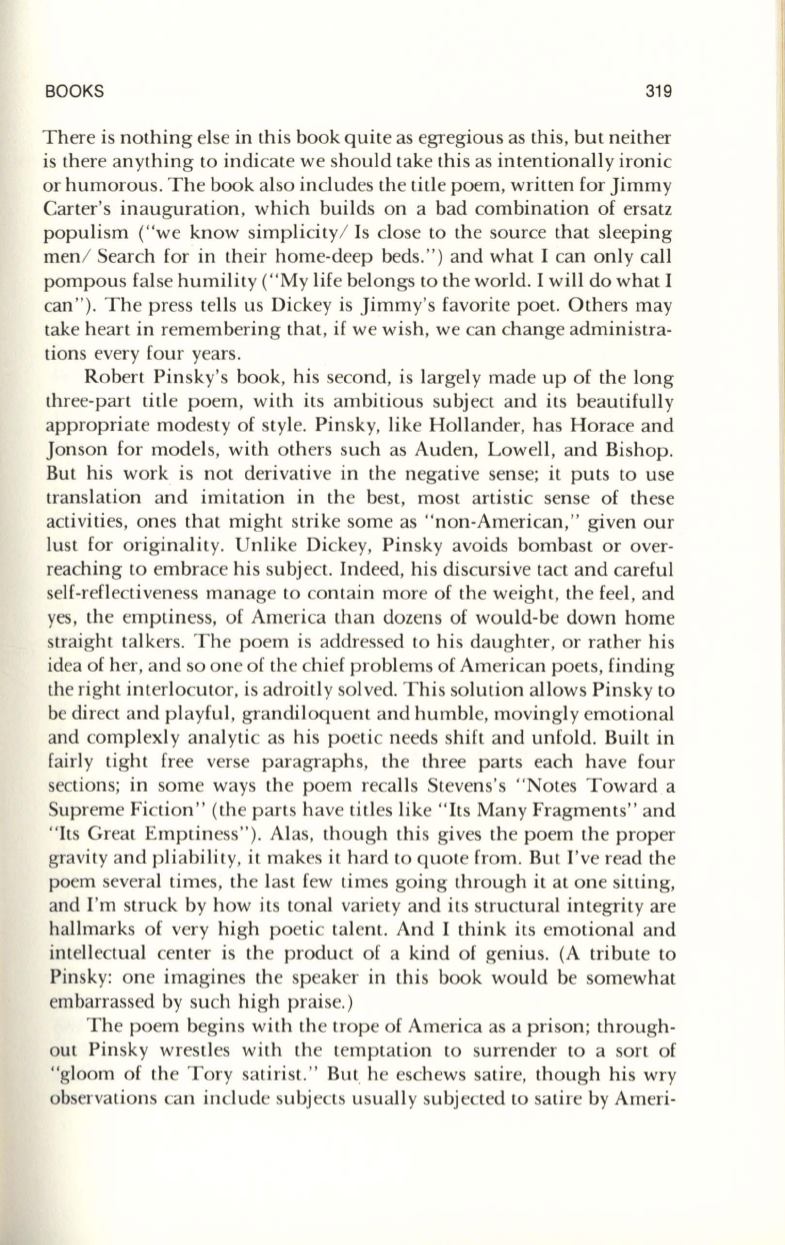
BOOKS
319
There is nothing else in this book quite as egregious as this, but neither
is there anything to indicate we should take this as intentionally ironic
or humorous. The book also includes the title poem, written for Jimmy
Carter's inauguration, which builds on a bad combination of ersatz
populism ("we know simplicity/ Is close to the source that sleeping
men/ Search for in their home-deep beds.") and what I can only call
pompous false humility ("My life belongs to the world. I will do what I
can"). The press tells us Dickey is Jimmy's favorite poet. Others may
take heart in remembering that, if we wish, we can change administra–
tions every four years.
Robert Pinsky's book, his second, is largely made up of the long
three-part title poem, with its ambitious subject and its beautifully
appropriate modesty of style. Pinsky, like Hollander, has Horace and
Jonson for models, with others such as Auden, Lowell, and Bishop.
But his work is not derivative in the negative sense; it puts to use
translation and imitation in the best, most artistic sense of these
activities, ones that might strike some as "non-American," given our
lust for originality. Unlike Dickey, Pinsky avoids bombast or over–
reaching to embrace his subject. Indeed, his discursive tact and careful
self-reflectiveness manage to contain more of the weight, the feel, and
yes, the emptiness, of America than dozens of would-be down home
straight talkers. The poem is addressed to his daughter, or rather his
idea of her, and so one of the chief problems of American poets, finding
the right interlocutor, is adroitly solved. This solution allows Pinsky to
be direct and playful, grandiloquent and humble, movingly emotional
and complexly analytic as his poetic needs shift and unfold. Built in
fairly tight free verse paragraphs, the three parts each have four
sections; in some ways the poem recalls Stevens's "Notes Toward a
Supreme Fiction" (the parts have titles like "Its Many Fragments" and
"Its Great Emptiness"). Alas, though this gives the poem the proper
gravity and pliability, it makes it hard to quote from. But I've read the
poem several times, the last few times going through it at one sitting,
and I'm struck by how its tonal variety and its structural integrity are
hallmarks of very high poetic talent. And I think its emotional and
intellectual center is the product of a kind of genius. (A tribute to
Pinsky: one imagines the speaker in this book would be somewhat
embarrassed by such high praise.)
The poem begins with the trope of America as a prison; through–
out Pinsky wrestles with the temptation to surrender to a sort of
"gloom of the Tory satirist." But he eschews satire, though his wry
observations can include subjects usually subjected to satire by Ameri-


